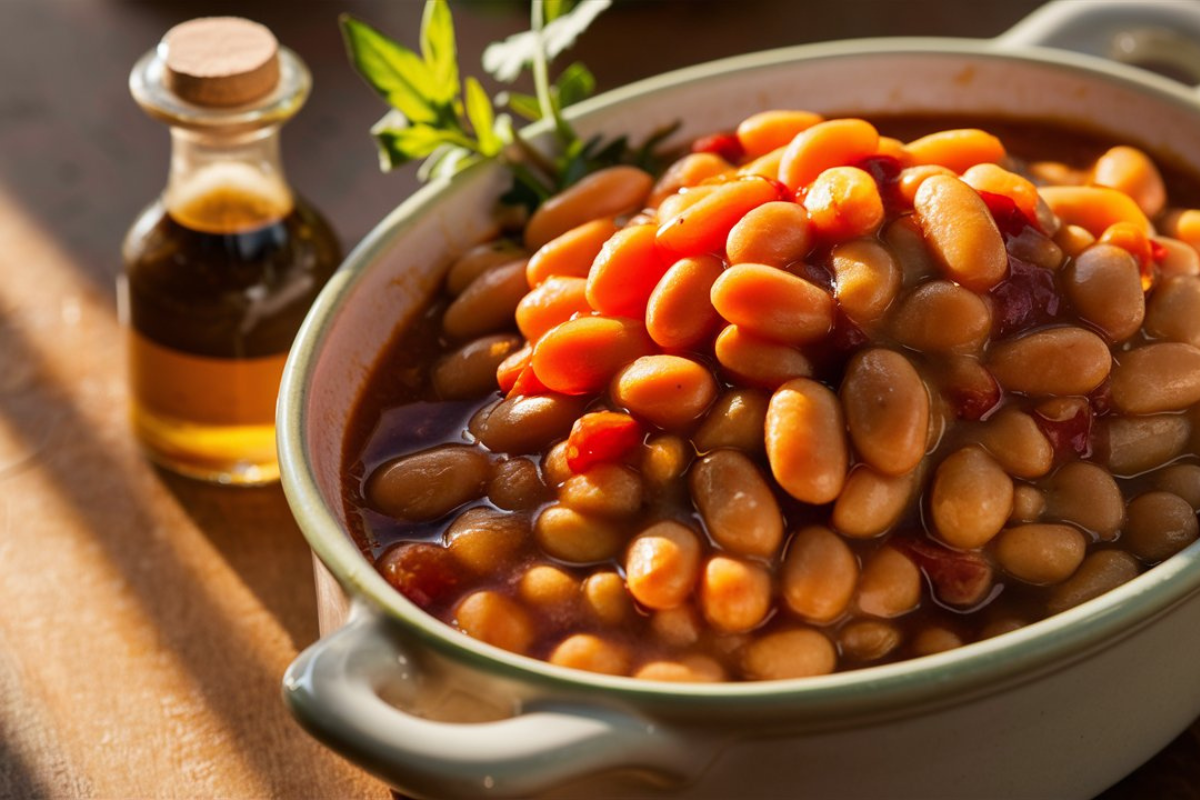Baked beans have become a staple in many cuisines around the world. An intriguing ingredient often found in these dishes is vinegar, which plays a crucial role in enhancing the culinary experience. This article explores the various reasons and benefits of incorporating vinegar into baked beans.
Historical Context and Traditional Uses
Ancient Origins and Preservation Techniques
The practice of adding vinegar to beans dates back to ancient culinary traditions. Originally, this method was likely developed as a way to enhance flavor profiles and preserve food, a vital necessity before the advent of modern refrigeration. Over the centuries, various cultures have incorporated vinegar into their bean dishes, each adding a unique twist that reflects their culinary heritage.
Preservation Benefits
Before the days of refrigerators, preserving food was a major challenge. Vinegar, with its acidic properties, acts as a natural preservative, inhibiting the growth of bacteria. This quality made it invaluable for storing food, including beans, for extended periods.
Flavor and Cultural Significance
Vinegar’s sharpness cuts through the natural blandness of beans, adding a tangy contrast that can enhance the overall taste of a dish. This balance of flavors is particularly appreciated in recipes where beans are the main ingredient. In many cultures, the addition of vinegar to beans has deeper roots that go beyond taste and preservation. It often plays a part in traditional recipes passed down through generations, embodying a sense of heritage and continuity in culinary practices.
Culinary Reasons for Adding Vinegar
Enhancing Flavors and Textures
Vinegar is more than just a seasoning—it’s a multifaceted ingredient that enhances the culinary quality of dishes, especially in the case of baked beans. Vinegar is renowned for its ability to elevate the flavors in a dish. In baked beans, it cuts through the inherent sweetness of the beans and other ingredients like molasses or sugar, introducing a contrasting tanginess that enriches the overall taste profile.
Improving Consistency and Digestibility
Adding vinegar to beans can alter their texture, making them softer and more palatable. The acid in vinegar breaks down some of the tougher fibers in beans, which can help in reducing cooking time and improving the consistency of the final product. This makes the beans easier to digest and more enjoyable to eat.
Preservation and Color Enhancement
Vinegar can help maintain the vibrant color of ingredients in the dish. In the case of baked beans, it helps in preserving the rich, appealing color of the sauce, making the dish more visually enticing. While less of a concern in modern times with advanced food preservation technology, vinegar’s preservative qualities still play a role in the longevity of prepared dishes. When added to baked beans, vinegar can help prevent spoilage and extend the dish’s shelf life, which is particularly useful for batch cooking or storing leftovers.
Types of Vinegar Used in Baked Beans
In the preparation of baked beans, the type of vinegar used can significantly influence the flavor, acidity, and overall character of the dish. Here are some commonly used vinegars in baked beans recipes, each contributing its unique taste and properties:
White Vinegar: The Classic Choice
White vinegar is perhaps the most common and versatile type of vinegar used in cooking. In baked beans, it adds a sharp, pronounced tanginess and a clean, clear flavor that doesn’t overpower the other ingredients. Its strong acidity is excellent for balancing the sweetness of the beans.
Apple Cider Vinegar: Mild and Fruity
Known for its mild and fruity flavor, apple cider vinegar is a favorite among cooks looking to add a subtle tang with a hint of sweetness. It complements the rich flavors of traditional baked beans very well and can enhance the natural flavors of the beans and spices.
Balsamic Vinegar: Rich and Complex
Although less traditional, balsamic vinegar can be used for a richer, slightly sweet flavor with a complex profile. It adds depth to baked beans, along with a dark color and a rich aroma. This type of vinegar is ideal for gourmet variations of baked beans. For a deeper understanding of the role of different types of vinegar in cooking, explore this comprehensive guide on vinegar and its culinary applications.
Malt Vinegar: Distinctively British
With its strong, distinctive flavor, malt vinegar is popular in British cooking. It provides a unique twist to baked beans, offering a different kind of tanginess that works well with the sweetness of the sauce.
Each type of vinegar brings its own set of flavors and benefits to baked beans, allowing for customization and experimentation in the kitchen. Choosing the right vinegar depends on the desired outcome of the dish and personal taste preferences, whether one is aiming for a sharp tang, a subtle sweetness, or a rich, complex flavor.
Nutritional Aspects of Vinegar in Baked Beans
Incorporating vinegar into baked beans enhances taste, texture, and nutrition. Understanding these benefits highlights why vinegar is a key ingredient in this traditional dish.
Health Benefits
- Digestive Health: Vinegar stimulates stomach acid production, aiding digestion. This is beneficial for high-fiber foods like beans, reducing digestive discomfort.
- Blood Sugar Control: Vinegar can improve insulin sensitivity by 19-34% during high-carb meals. This helps slow the rise in blood sugar, beneficial for diabetes management.
- Weight Management: Studies suggest that vinegar increases fullness, leading to lower calorie intake and potential weight loss. When added to fiber-rich baked beans, this effect may enhance weight management efforts.
- Heart Health: Vinegar may help lower cholesterol and blood pressure. Given the high protein and fiber in beans, this combination is ideal for cardiovascular health.
Nutritional Synergy of Vinegar in Baked Beans
Beans and vinegar not only taste great together but also boost nutritional benefits. Beans are rich in protein, fiber, vitamins, and minerals. Vinegar improves nutrient absorption, such as iron, which is crucial for preventing anemia and supporting healthy blood function.
FAQ: Vinegar in Baked Beans
Why do some baked beans recipes include vinegar?
Recipes use vinegar mainly for flavor balance and preservation. The choice varies by region and cooking style.
Can you substitute vinegar?
Yes, you can substitute vinegar with lemon juice or citric acid. However, this will change the flavor profile.
How does vinegar affect the nutritional value of baked beans?
Vinegar enhances the nutritional value by adding beneficial acids. These acids aid digestion and metabolism.

